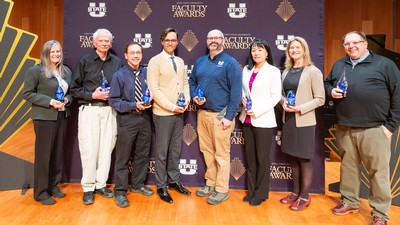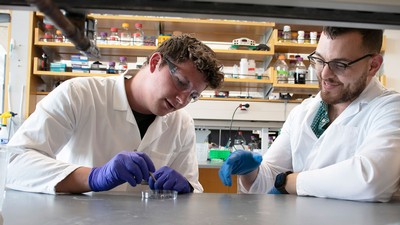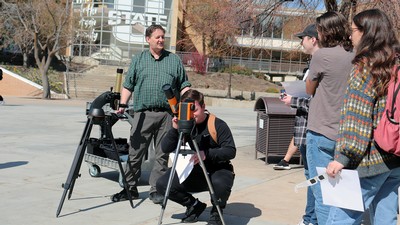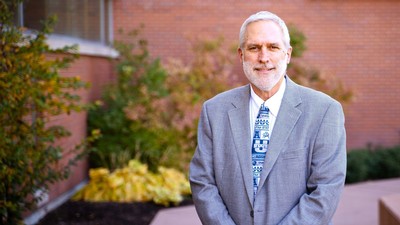Advisory Role: New Research Suggests Peer-Adviser Relationship Is Key to Success
By Sydney Dahle |
Marissa Tsugawa speaks with students about engineering identity.
Collaborative research across the country has shown that strengthening the relationship between students and advisers can increase retention rates in engineering doctoral studies.
Utah State University Assistant Professor Marissa Tsugawa, along with professors from Penn State The University of Oregon, Indiana University Bloomington, North Carolina State University and University of Nevada, Reno, recently published a study with the Journal of Engineering Education on March 17. The study connects an engineering student’s identity and the intention to complete a Ph.D. in engineering. Identity is a role that students give themselves during their experiences in the lab and classroom, the authors argue, and when Ph.D. students fail to identify with engineering, some will not complete their degree.
This worries experts who say degree completion rates for doctoral engineering students remain stagnant at levels lower than necessary to meet national and global requirements. Strengthening the adviser-peer relationship might fix that.
Nearly 1,800 Ph.D. students from 98 universities were asked about their intent to finish their studies and if they identified as an engineer.
“In this work, we seek to identify to what extent do adviser and peer relationships predict the intention of finishing a Ph.D. and the potential relevance of the number of years in the doctoral program,” Tsugawa said. “To do this, we explore engineering identification variables as predictors of the intent to complete a doctoral degree and explore alternative interventions to increase degree completion rates.”
The results of this research showed that interest and performance for each individual tended to predict the intention to complete a degree. Overall, graduate engineering identity explained a 9.5 percent variation in degree completion intention beyond adviser and peer relationship variables and the number of years in graduate programs.
“This means that research interest and scientific knowledge could be key when engaging with engineering identity to improve degree completion rates,” Tsugawa said. “Efforts should be made to remove barriers and provide support to develop Ph.D. performance.”
Tsugawa’s research examines engineering identity and neurodiversity amongst STEM students. This is one of many papers they have been a collaborator on, and it is their hope to provide better opportunities and support to neurodivergent engineering students.
WRITER
Sydney Dahle
Public Relations Specialist
College of Engineering
435-797-7512
sydney.dahle@usu.edu
CONTACT
Marissa Tsugawa
Assistant Professor
Engineering Education
435-797-1248
marissa.tsugawa@usu.edu
TOPICS
Engineering 336stories Education 332stories STEM 162storiesComments and questions regarding this article may be directed to the contact person listed on this page.







